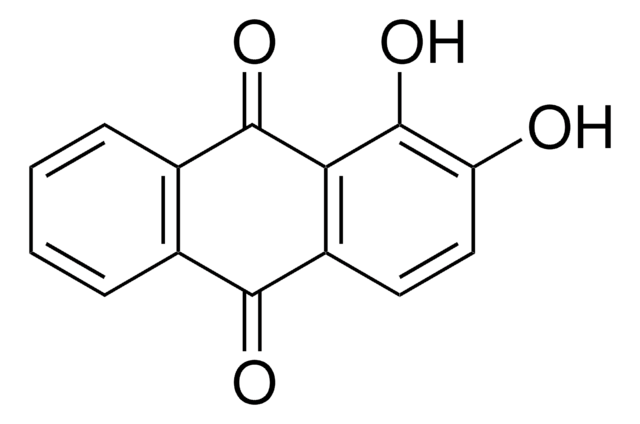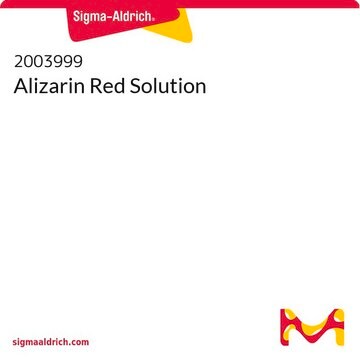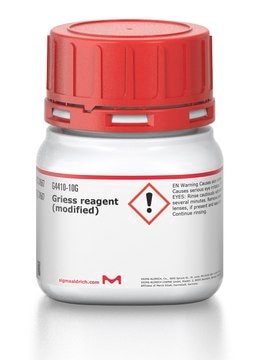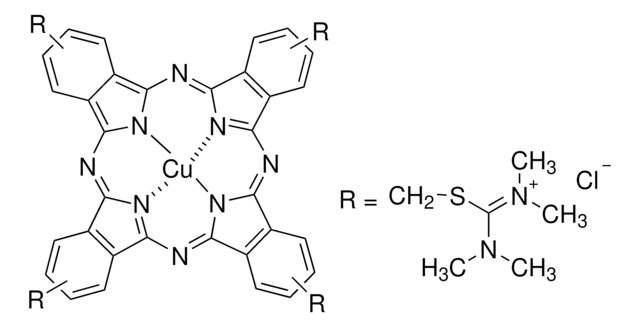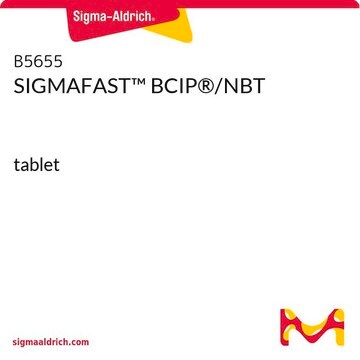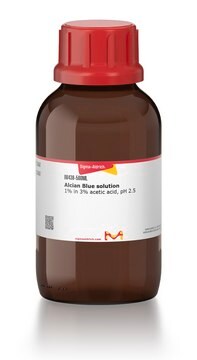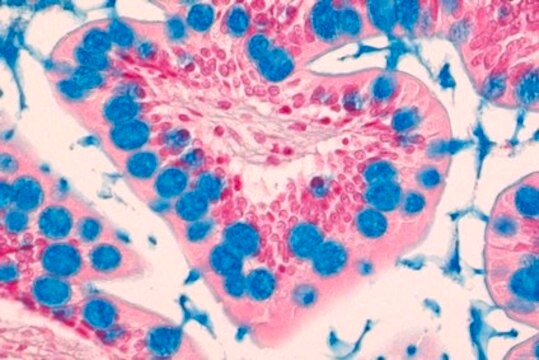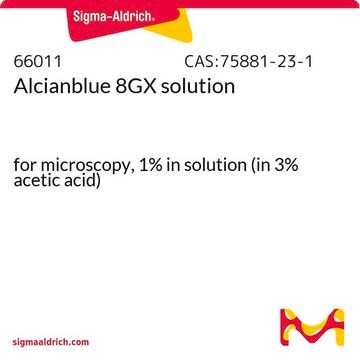おすすめの製品
product name
Alizarin red S mono sodiumsalt (C.I. 58005), visual transition interval 4.3-6.3, yellow to pink, visual transition interval 9.4-12.0, brown-orange to violet
損失
≤10% loss on drying, 110°C
品質水準
visual transition interval
4.3-6.3, yellow to pink
9.4-12.0, brown-orange to violet
Amax
418-424 nm (buffer pH 4.3
buffer pH 4.3
1 buffer pH 4.3)
444-450 nm (buffer pH 9.4)
510-517 nm (buffer pH 6.3)
554-558 nm (buffer pH 12.0)
保管温度
2-30°C
InChI
1S/C14H8O7S.Na/c15-11-6-3-1-2-4-7(6)12(16)10-8(11)5-9(22(19,20)21)13(17)14(10)18;/h1-5,17-18H,(H,19,20,21);/q;+1/p-1
InChI Key
HFVAFDPGUJEFBQ-UHFFFAOYSA-M
詳細
for analysis and indicator
アプリケーション
- A ratiometric fluorescence strategy based on inner filter effect for Cu(2+)-mediated detection of acetylcholinesterase.: This study utilizes Alizarin Red S to develop a fluorescence-based method for detecting copper ions and acetylcholinesterase activity, important for environmental monitoring and medical diagnostics (Li et al., 2021 doi:10.1007/s00604-021-05044-0).
- Multiplex SERS Chemosensing of Metal Ions via DNA-Mediated Recognition.: Explores the complexation of Alizarin Red S with different metal ions, utilizing Surface-Enhanced Raman Spectroscopy (SERS) for sensitive detection, which can be applied in environmental analysis and health sciences (Guerrini and Alvarez-Puebla, 2019 doi:10.1021/acs.analchem.9b02385).
- Capsicum-Derived Biomass Quantum Dots Coupled with Alizarin Red S as an Inner-Filter-Mediated Illuminant Nanosystem for Imaging of Intracellular Calcium Ions.: This innovative approach uses Alizarin Red S in a composite nanosystem for advanced imaging techniques to monitor intracellular activities, offering potential in biomedical research and diagnostics (Chen et al., 2018 doi:10.1021/acs.analchem.8b04055).
- Ratiometric fluorescent probe based on gold nanoclusters and alizarin red-boronic acid for monitoring glucose in brain microdialysate.: Highlights the application of Alizarin Red S in developing a glucose monitoring system, which is critical for understanding metabolic processes in neurological studies (Wang et al., 2014 doi:10.1021/ac5023293).
アナリシスノート
Identity (UV/VIS-Spectrum): passes test
1st transition range: pH 4.3 - pH 6.3 Lightly yellow - pink
2nd transition range: pH 9.4 - pH 12.0 Brown orange - violet
Absorption maximum λ 1 (buffer pH 4.3): 418 - 424 nm
Absorption maximum λ 2 (buffer pH 6.3): 510 - 517 nm
Absorption maximum λ 3 (buffer pH 9.4): 444 - 450 nm
Absorption maximum λ 4 (buffer pH 12.0): 554 - 558 nm
Spec. Absorptivity A 1%/1cm (λ1max; 0.01 g/l; buffer pH 4.3; calc. on dried substance): 135 - 180
Spec. Absorptivity A 1%/1cm (λ2max; 0.01 g/l; buffer pH 6.3; calc. on dried substance): 145 - 210
Spec. Absorptivity A 1%/1cm (λ3max; 0.01 g/l; buffer pH 9.4; calc. on dried substance): 170 - 230
Spec. Absorptivity A 1%/1cm (λ4max; 0.01 g/l; buffer pH 12.0; calc. on dried substance): 340 - 520
Loss on drying (110 °C): ≤ 10 %
1st transition range: pH 4.3 - pH 6.3 Lightly yellow - pink
2nd transition range: pH 9.4 - pH 12.0 Brown orange - violet
Absorption maximum λ 1 (buffer pH 4.3): 418 - 424 nm
Absorption maximum λ 2 (buffer pH 6.3): 510 - 517 nm
Absorption maximum λ 3 (buffer pH 9.4): 444 - 450 nm
Absorption maximum λ 4 (buffer pH 12.0): 554 - 558 nm
Spec. Absorptivity A 1%/1cm (λ1max; 0.01 g/l; buffer pH 4.3; calc. on dried substance): 135 - 180
Spec. Absorptivity A 1%/1cm (λ2max; 0.01 g/l; buffer pH 6.3; calc. on dried substance): 145 - 210
Spec. Absorptivity A 1%/1cm (λ3max; 0.01 g/l; buffer pH 9.4; calc. on dried substance): 170 - 230
Spec. Absorptivity A 1%/1cm (λ4max; 0.01 g/l; buffer pH 12.0; calc. on dried substance): 340 - 520
Loss on drying (110 °C): ≤ 10 %
保管分類コード
11 - Combustible Solids
WGK
WGK 3
引火点(°F)
Not applicable
引火点(℃)
Not applicable
試験成績書(COA)
製品のロット番号・バッチ番号を入力して、試験成績書(COA) を検索できます。ロット番号・バッチ番号は、製品ラベルに「Lot」または「Batch」に続いて記載されています。
この製品を見ている人はこちらもチェック
ライフサイエンス、有機合成、材料科学、クロマトグラフィー、分析など、あらゆる分野の研究に経験のあるメンバーがおります。.
製品に関するお問い合わせはこちら(テクニカルサービス)

